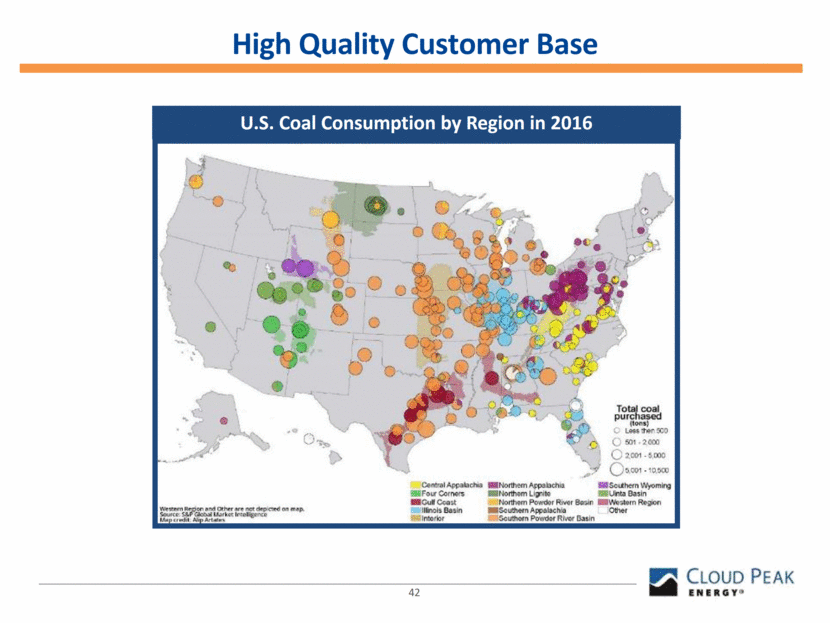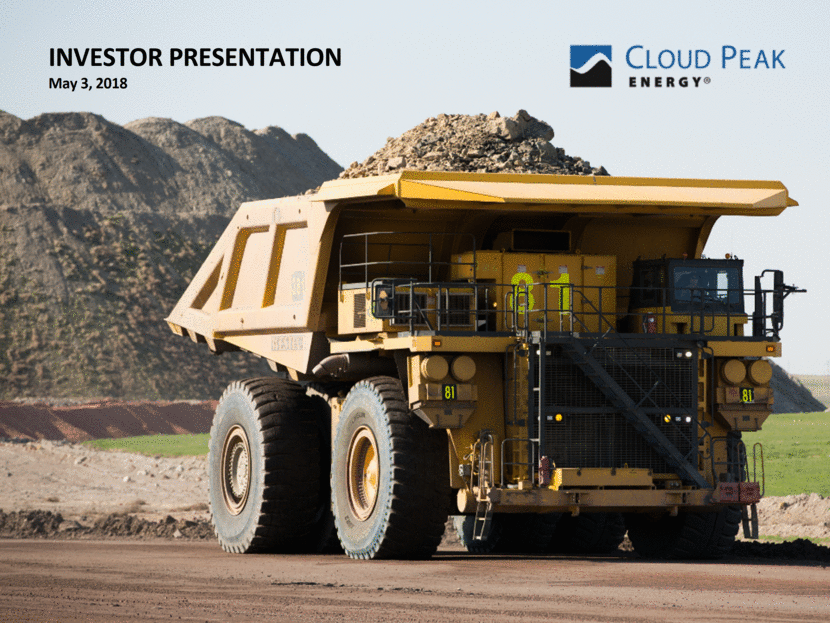Attached files
| file | filename |
|---|---|
| 8-K - 8-K - CLOUD PEAK ENERGY INC. | a18-8615_48k.htm |
Cautionary Note Regarding Forward-Looking Statements This presentation contains “forward-looking statements” within the meaning of the safe harbor provisions of Section 27A of the Securities Act of 1933 and Section 21E of the Securities Exchange Act of 1934. Forward-looking statements are not statements of historical facts, and often contain words such as “may,” “will,” “expect,” “believe,” “anticipate,” “plan,” “estimate,” “seek,” “could,” “should,” “intend,” “potential,” or words of similar meaning. Forward-looking statements are based on management’s current expectations, beliefs, assumptions and estimates regarding our company, industry, economic conditions, government regulations, energy policies and other factors. These statements are subject to significant risks, uncertainties and assumptions that are difficult to predict and could cause actual results to differ materially and adversely from those expressed or implied in the forward-looking statements. For a description of some of the risks and uncertainties that may adversely affect our future results, refer to the risk factors described from time to time in the reports and registration statements we file with the Securities and Exchange Commission, including those in Item 1A "Risk Factors" of our most recent Form 10-K and any updates thereto in our Forms 10-Q and Forms 8-K. There may be other risks and uncertainties that are not currently known to us or that we currently believe are not material. We make forward-looking statements based on currently available information, and we assume no obligation to, and expressly disclaim any obligation to, update or revise publicly any forward-looking statements made in our presentation, whether as a result of new information, future events or otherwise, except as required by law. Non-GAAP Financial Measures This presentation includes the non-GAAP financial measure of Adjusted EBITDA (on a consolidated basis and for our reporting segments). Adjusted EBITDA is intended to provide additional information only and does not have any standard meaning prescribed by accounting principles generally accepted in the U.S. (“GAAP”). A quantitative reconciliation of historical net income (loss) and segment operating income (loss) to Adjusted EBITDA (as defined below) is found in the tables accompanying this presentation. EBITDA represents net income (loss) before: (1) interest income (expense) net, (2) income tax provision, (3) depreciation and depletion, and (4) amortization. Adjusted EBITDA represents EBITDA as further adjusted for accretion, which represents non-cash increases in asset retirement obligation liabilities resulting from the passage of time, and specifically identified items that management believes do not directly reflect our core operations. For the periods presented herein, the specifically identified items are: (1) adjustments to exclude the changes in the Tax Receivable Agreement, (2) adjustments for derivative financial instruments, excluding fair value mark-to-market gains or losses and including cash amounts received or paid, (3) adjustments to exclude non-cash impairment charges, (4) adjustments to exclude debt restructuring costs, (5) non-cash throughput amortization expense and contract termination payments made to amend the BNSF and Westshore agreements, and (6) adjustments to exclude the gain from the sale of our 50% non-operating interest in the Decker Mine in September 2014. We enter into certain derivative financial instruments such as put options that require the payment of premiums at contract inception. The reduction in the premium value over time is reflected in the mark-to-market gains or losses. Our calculation of Adjusted EBITDA does not include premiums paid for derivative financial instruments; either at contract inception, as these payments pertain to future settlement periods, or in the period of contract settlement, as the payment occurred in a preceding period. In prior years the amortization of port and rail contract termination payments were included as part of EBITDA and Adjusted EBITDA because the cash payments approximated the amount of amortization being taken during the year. During 2017, management determined that the non-cash portion of amortization arising from payments made in prior years as well as the amortization of contract termination payments should be adjusted out of Adjusted EBITDA because the ongoing cash payments are now significantly smaller than the overall amortization of these payments and no longer reflect the transactional results. Because of the inherent uncertainty related to the items identified above, management does not believe it is able to provide a meaningful forecast of the comparable U.S. GAAP measures or reconciliation to any forecasted U.S. GAAP measure. Adjusted EBITDA is an additional tool intended to assist our management in comparing our performance on a consistent basis for purposes of business decision making by removing the impact of certain items that management believes do not directly reflect our core operations. Adjusted EBITDA is a metric intended to assist management in evaluating operating performance, comparing performance across periods, planning and forecasting future business operations and helping determine levels of operating and capital investments. Period-to-period comparisons of Adjusted EBITDA are intended to help our management identify and assess additional trends potentially impacting our company that may not be shown solely by period-to-period comparisons of net income (loss) and segment operating income (loss). Consolidated Adjusted EBITDA is also used as part of our incentive compensation program for our executive officers and others. We believe Adjusted EBITDA is also useful to investors, analysts and other external users of our consolidated financial statements in evaluating our operating performance from period to period and comparing our performance to similar operating results of other relevant companies. Adjusted EBITDA allows investors to measure a company’s operating performance without regard to items such as interest expense, taxes, depreciation and depletion, amortization and accretion and other specifically identified items that are not considered to directly reflect our core operations. Our management recognizes that using Adjusted EBITDA as a performance measure has inherent limitations as compared to net income (loss) and segment operating income (loss), or other GAAP financial measures, as this non-GAAP measure excludes certain items, including items that are recurring in nature, which may be meaningful to investors. As a result of these exclusions, Adjusted EBITDA should not be considered in isolation and does not purport to be an alternative to net income (loss) and segment operating income (loss) or other GAAP financial measures as a measure of our operating performance. Because not all companies use identical calculations, our presentation of Adjusted EBITDA may not be comparable to other similarly titled measures of other companies. 2
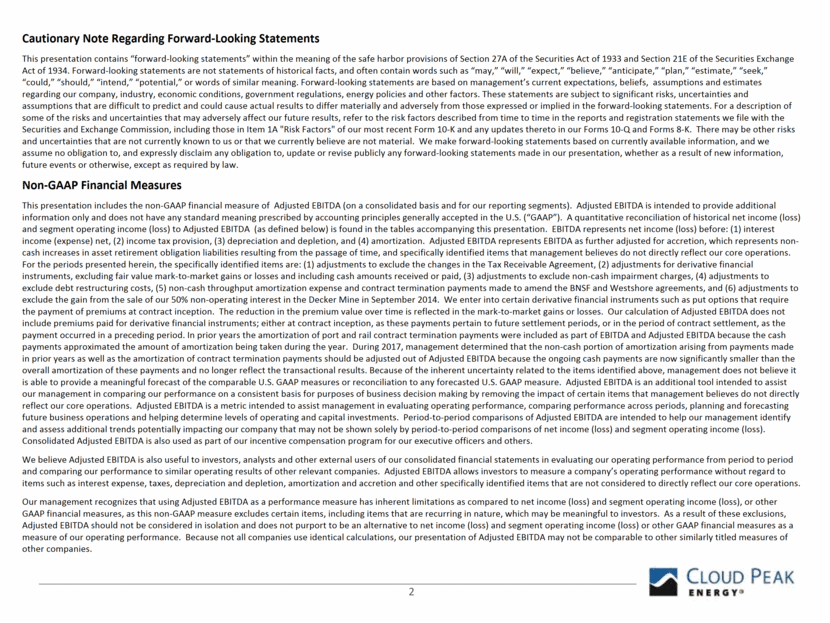
Cloud Peak Energy Profile 3
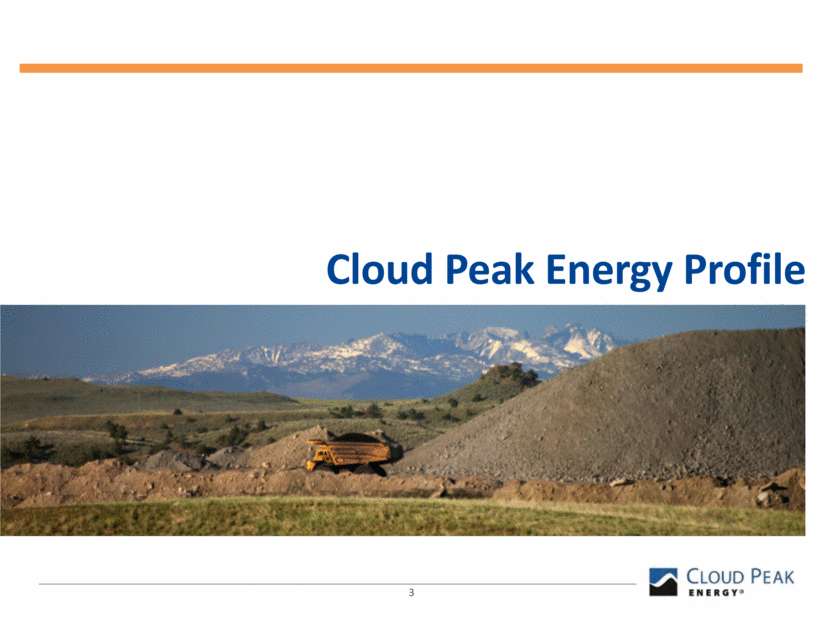
One of the largest U.S. coal producers and only PRB pure-play coal company 2017 coal shipments from our three mines of 57.4 million tons 2017 proven & probable reserves of 1.0 billion tons Approval received for LBM of approximately 14 million tons at Antelope Mine Extensive NPRB projects and options for long-term growth opportunities Employs approximately 1,300 people Company and Financial Overview NYSE: CLD (4/23/18) $2.98 Market Capitalization (4/23/18) $225.8 million Total Available Liquidity (3/31/18) $527.8 million 2017 Revenue $887.7 million Senior Debt Principal (3/31/18) $346.8 million 4
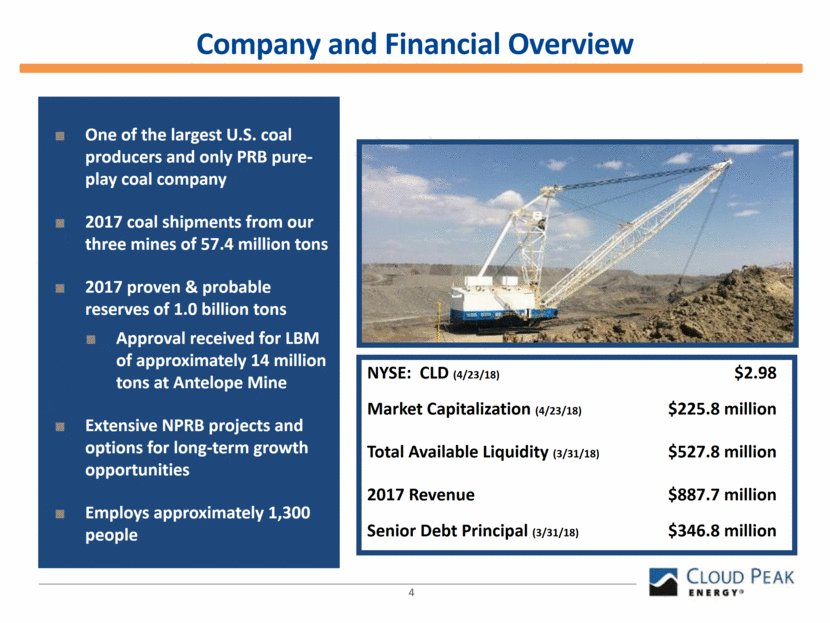
Good Safety Record = Well-Run Operations Source: Mine Safety and Health Administration Note: All Injury Frequency Rate = (total number of employee injuries x 200,000) / total man-hours. 5 Top Coal Producing Companies – 2016 All Injury Frequency Rates (MSHA) Cloud Peak Energy 2017 – 0.17 Cloud Peak Energy 2016 – 0.25 2017 2016 Company Best March 31, 2018 YTD MSHA AIFR 0.0 0.17 0.00 0.25 0.55 0.62 0.85 0.87 1.28 1.29 1.30 1.56 2.16 2.63 3.79 3.82 3.93 4.30 4.34 4.42 4.52 4.67 5.18 5.88 6.21 7.19 Cloud Peak Energy Global Mining Group Cloud Peak Energy Vistra Energy NACCO Industries Bowie Resources Kiewit Peter Sons Peabody Energy Western Fuels Allete Arch Coal Westmoreland Alpha Natural Resources Coronado Coal CONSOL Energy Armstrong Energy Coalfield Transport Alliance Resource Brent K Bilsland Contura Energy Alpha Natural Resources Foresight Energy Labor (Murray) Prairie State Energy Robert E Murray Blackhawk Mining
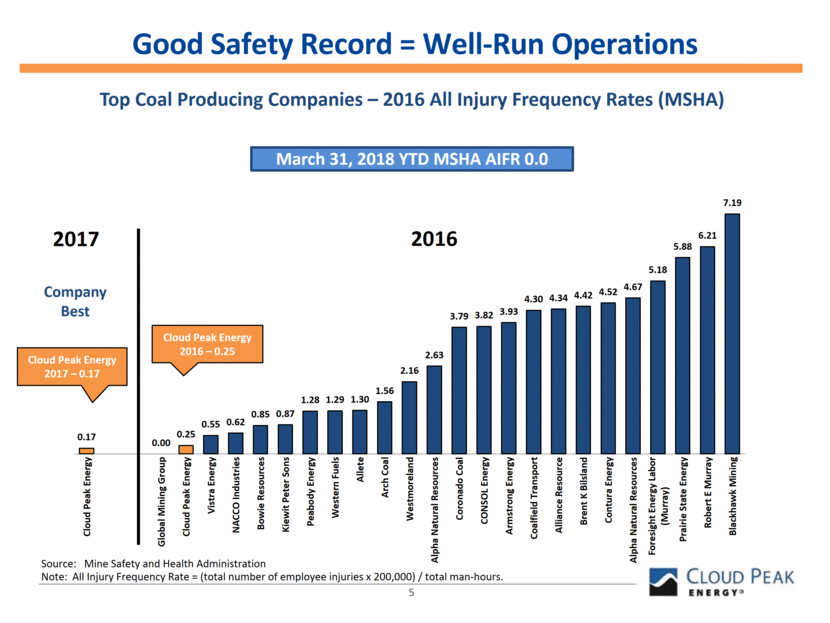
Low-Risk Surface Operations One of the best safety records in the industry. Surface mining allows for high-quality reclamation. Strong environmental compliance programs are ISO-14001 certified. Highly productive, non-unionized workforce at all of our mines. 6
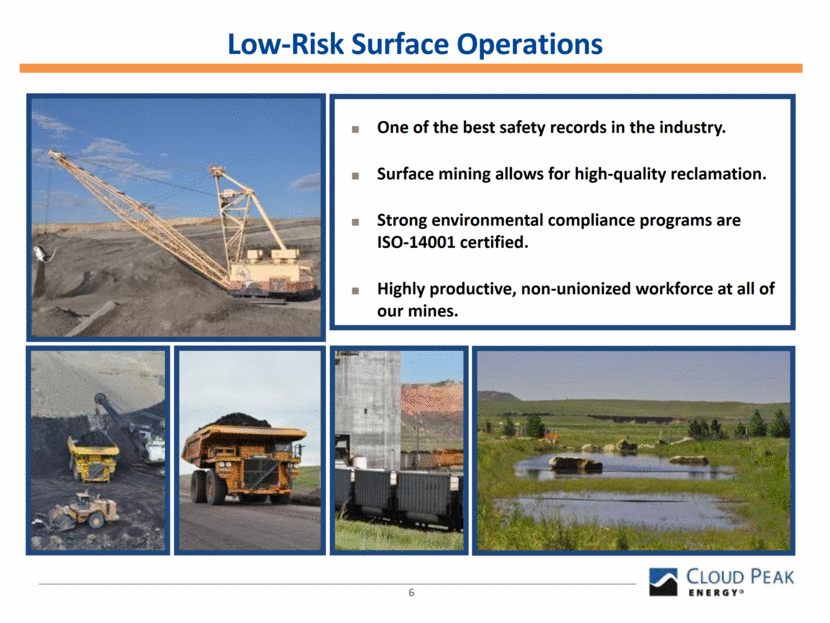
Increasing Workload A Function of Surface Mining in the PRB 7 Additional overburden as coal seams dip moving west. For 2018, our mine plans indicate that the strip ratio will increase more than recent years resulting in higher costs. Haul distances increase as mining pits progress further from the load-out. More equipment, personnel, resources required to maintain production.
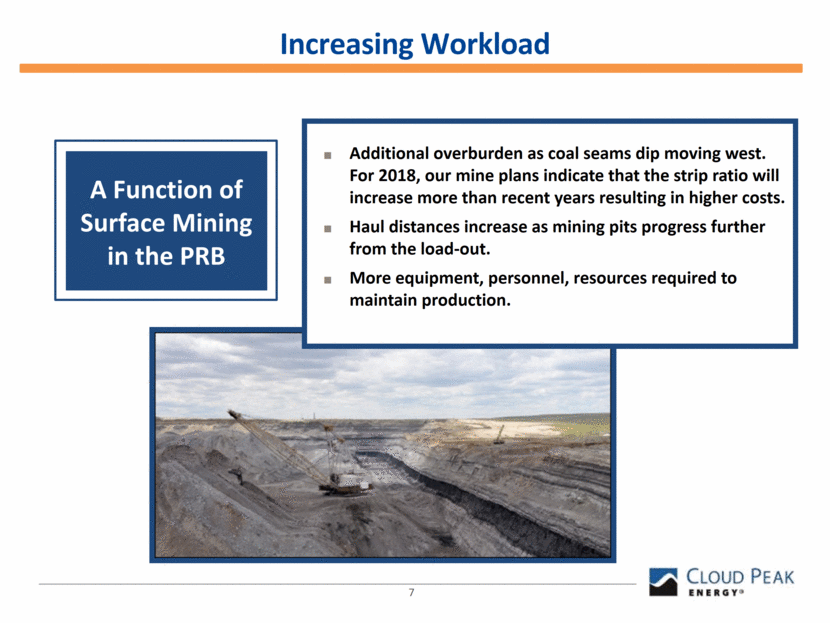
Extensive Coal Reserves and Projects Source: SNL Energy7 Assumes production at the 2017 level. Does not include a recently approved Lease by Modification that is expected to add approximately 14 million tons of recoverable coal. (3) Non-reserve coal deposits are not reserves under SEC Industry Guide 7. Estimates of non-reserve coal deposits are subject to further exploration and development, are more speculative, and may not be converted to future reserves of the company. (4) Subject to exercise of options. All options expire June 2018 unless one or more options are exercised by the expiration date. Represents a current estimate of physical in-place coal tons. Does not represent proven and probable reserves, non-reserve coal deposits or a forecast of tons to be produced and sold in the future. Future production and sales of such tons, if any, are subject to exercise of options and significant risk and uncertainty. 8 2017 Proven & Probable Reserves (as of 12/31/17) 1.0B Tons Spring Creek Mine – MT 2017 Tons Sold 12.6M tons 2017 Proven & Probable Reserves 235.2M tons Average Reserve Coal Quality 9,350 Btu/lb Mine Life (1) 19 years Cordero Rojo Mine – WY 2017 Tons Sold 16.4M tons 2017 Proven & Probable Reserves 299.0M tons Average Reserve Coal Quality 8,425 Btu/lb Mine Life (1) 18 years Antelope Mine – WY 2017 Tons Sold 28.4M tons 2017 Proven & Probable Reserves (2) 489.7M tons Average Reserve Coal Quality 8,875 Btu/lb Mine Life (1) 17 years 2017 Non-Reserve Coal Deposits (3) 0.35B Tons Antelope Mine 7.9M tons Cordero Rojo Mine 53.2M tons Spring Creek Mine 3.9M tons Youngs Creek Project (non-federal coal) 283.6M tons 348.6M tons Additional Non-Federal Coal (4) 1.4B Tons Big Metal Project 1,387M tons
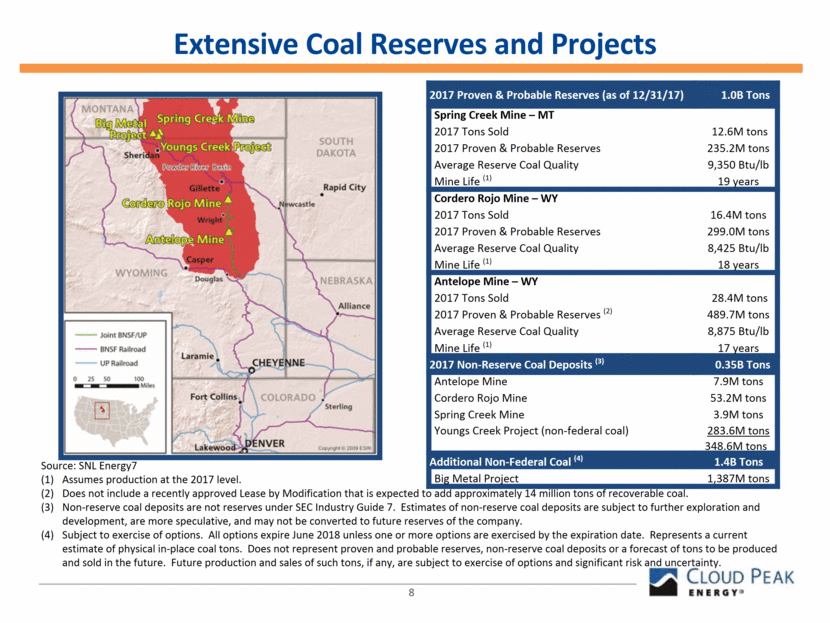
9 Spring Creek Complex Potential Development Options (1) Non-reserve coal deposits are not reserves under SEC Industry Guide 7. Estimates of non-reserve coal deposits are subject to further exploration and development, are more speculative, and may not be converted to future reserves of the company. (2) Represents a current estimate of physical in-place coal tons. Does not represent proven and probable reserves, non-reserve coal deposits or a forecast of tons to be produced and sold in the future. Future production and sales of such tons, if any, are subject to exercise of options and significant risk and uncertainty. Youngs Creek Project 284 million tons of non-reserve coal deposits at December 31, 2017. (1) Contracted royalty payments of 8% vs. 12.5% federal rate. 48,000 controlled acres of surface land connecting Youngs Creek, Spring Creek, and Big Metal deposits. Big Metal Project Options to lease up to 1.4 billion tons(2) of in-place coal on the Crow Indian Reservation. BIA issued approval of option agreements in June 2013. All options expire in June 2018 unless one or more options are exercised by the expiration date. Option avoids significant upfront bonus payments as compared to federal LBAs. Sliding scale royalty rate to the Crow Tribe of 7.5% - 15% vs. 12.5% federal rate.
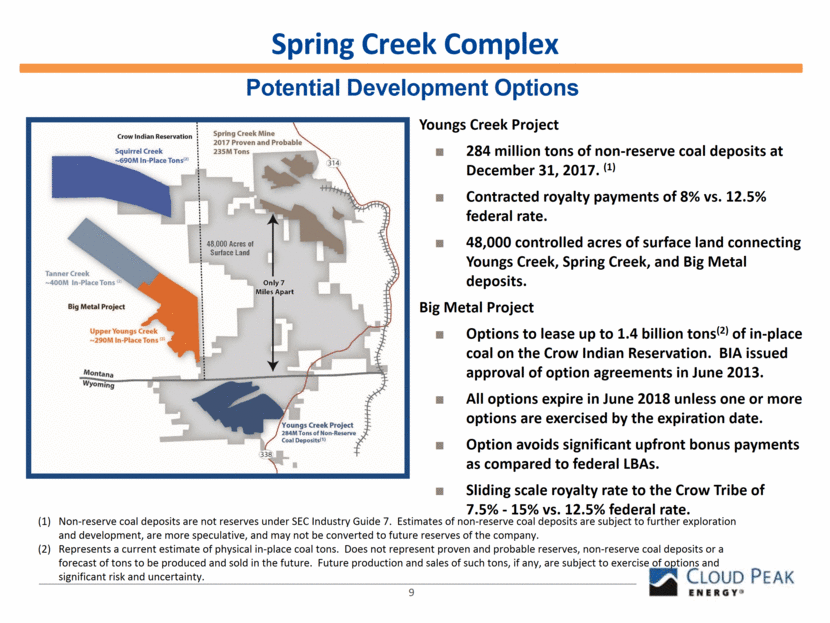
10 Spring Creek Complex High Btu Coal Resources No new federal coal LBAs have been issued in the PRB since 2012, and the Bureau of Land Management has no PRB leases scheduled for sale at this time. Prospects for new LBAs have been challenged in recent years by low coal prices, financial challenges facing the industry, and federal regulatory pressures. Currently leased 8800 Btu coal reserves in the PRB are expected to decline at current production rates over the next 5-7 years absent new LBAs. The process to obtain, permit, and develop new LBA reserves has recently taken 7-10 years. The Spring Creek Complex offers an opportunity to incrementally develop lower ratio, >9000 Btu coal potentially in the 2020-2021 timeframe by leveraging the existing Spring Creek Mine loadout and infrastructure. Cloud Peak Energy is actively seeking to develop new domestic and international customers for Spring Creek coal to provide a foundation for potential development of the Spring Creek Complex.
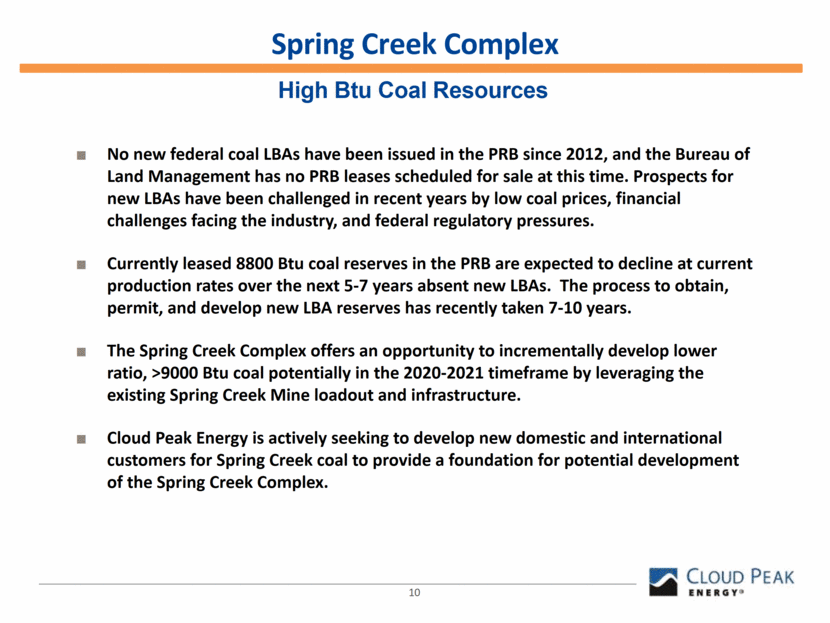
11 Spring Creek Complex Export Quality and Rail Haul Advantage Source: SNL, Wood Mackenzie, Company estimates 4770-4850 4544 In decline Average Higher Quality Product Location Spring Creek Complex is closer to the West Coast export terminals than SPRB mines resulting in lower rail costs. Quality Spring Creek Mine is a premium subbituminous coal for many Asian utilities valued for its consistent quality and higher heat content. Indonesian coal (the primary international competitor) has a wide quality range. Spring Creek Complex Indonesian average export coal quality has been declining within the band shown above, creating concerns for fuel buyers. Higher quality Indonesian coal is increasingly being withheld to meet growing domestic demand. 3700 3900 4100 4300 4500 4700 4900 Indonesian Coal 8800 Btu Spring Creek Kcal/kg NAR
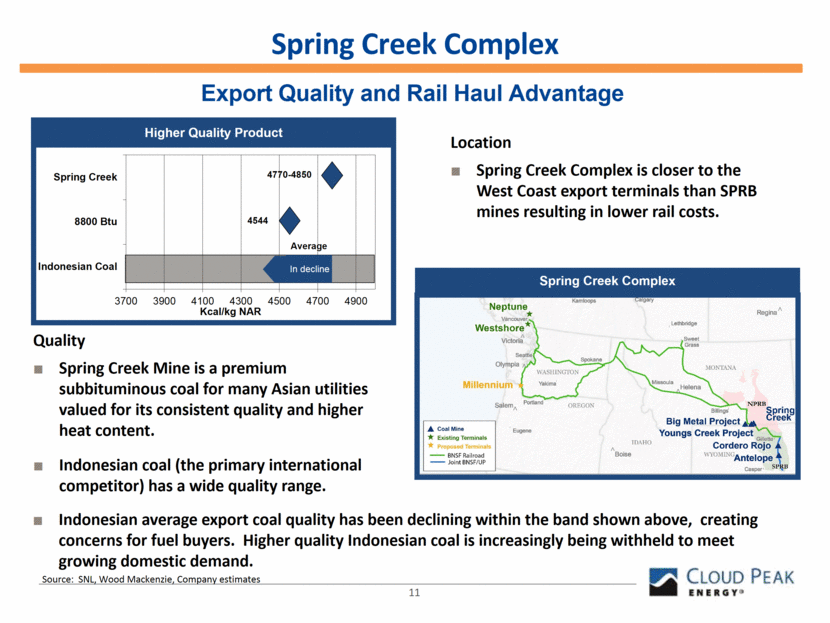
Positioned to Capitalize on Improving Export Sales Optionality to Grow Exports We exported 1.4 million tons through Westshore in Q1 2018. Through April 24, we had contracted to ship 60% of our 2018 planned export volumes. Long-term agreement with JERA Trading to supply new IGCC plants currently under construction in Japan. (million tons) Export Tons $103 $85 $71 $59 Avg. annual Newcastle benchmark ($/metric ton) 12 $66 $89 4.4 4.7 4.0 3.6 0.4 4.2 5.5 2012 2013 2014 2015 2016 2017 2018E
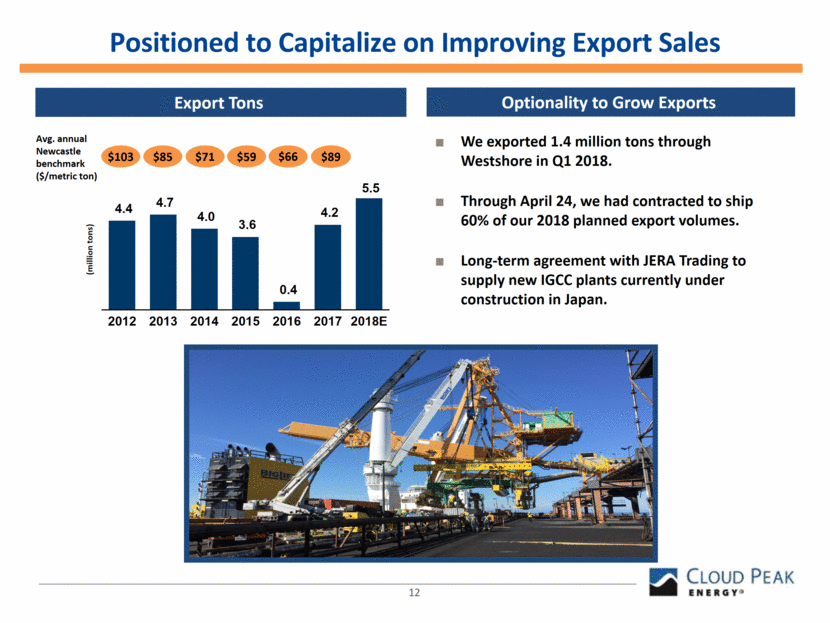
13 Cloud Peak Energy-JERA Trading Agreement Export coal supply agreement with JERA Trading JERA Trading exercised its option to increase volumes by 20% under the previously announced long-term agreement for the supply of coal to two new coal-fired integrated gasification combined cycle plants being developed in the Fukushima Prefecture in Japan. Shipments are expected to commence as early as the end of 2019 and continue for up to forty months, reaching up to 1.3 million tons in the final contract year. Cloud Peak Energy Export Capacity Position Back-to-back agreements with Westshore and BNSF in support of the JERA Trading agreement, together with the base Westshore and BNSF agreement terms through 2020, provide Cloud Peak Energy with a firm export capacity foundation for many years. 0 1 2 3 4 5 6 2018 2019 2020 2021 2022 2023 (million tons) JERA Trading Extended Westshore and BNSF Agreements Amended Westshore and BNSF Agreements Westshore and BNSF base export agreements in blue extended through 2020 JERA Trading (estimates)
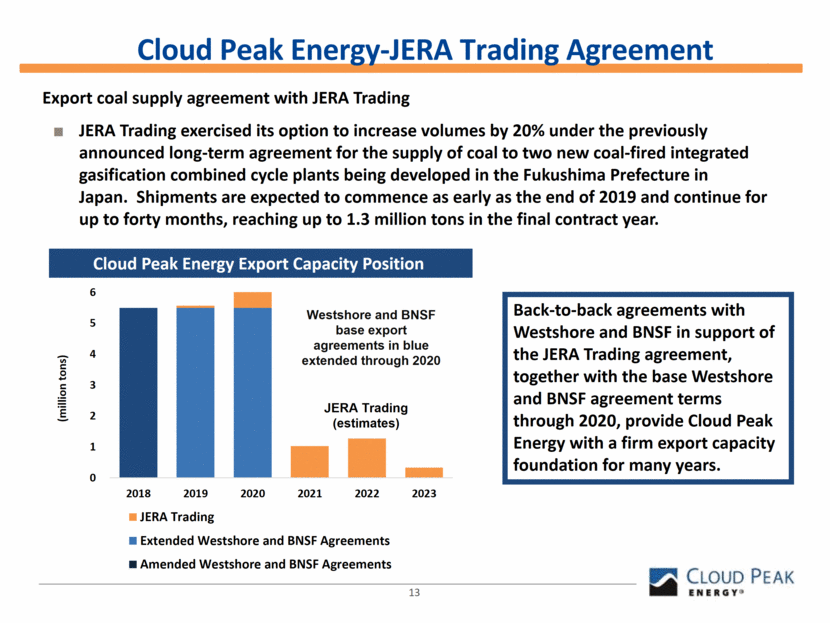
14 Cloud Peak Energy Terminal Position Westshore Terminal – Existing lowest cost, Capesize port Capesize vessels – deep-water port. 5.5 million tons of port capacity extended through 2020. Additional volumes for JERA Trading business through the first quarter of 2023. Proposed Millennium Bulk Terminals (MBT) Potential capacity to load up to Panamax size vessels. Cloud Peak Energy option for up to 3 million metric tons per year at Stage 1 development and an additional 4 million metric tons per year at Stage 2. Permitting process continues, including active legal challenges by MBT for certain denied State-level permits.
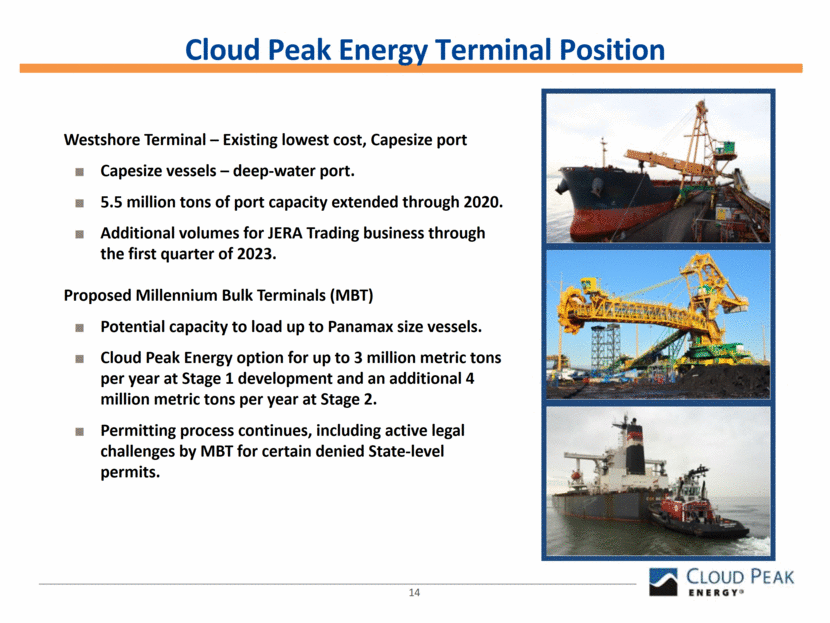
Domestic Coal Environment Conditions and Regulations 15
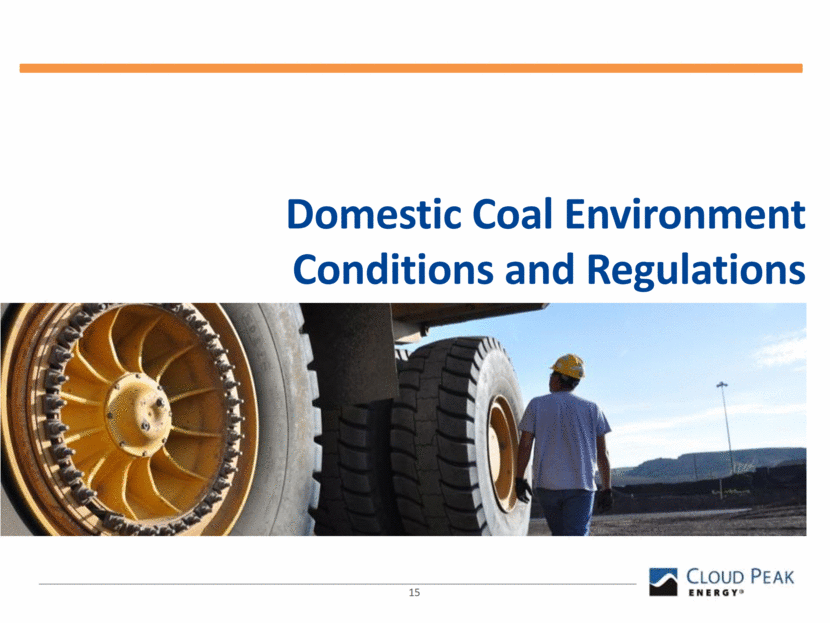
Domestic Environment Coal production in the U.S. increased 6% in 2017 over 2016, while PRB production was up almost 7% for the same period. (1) Colder weather during Q1 2018 reduced customers’ coal inventories, which could result in additional purchases during the remaining quarters of 2018. PRB stockpiles at utilities are estimated at 66 million tons at end of March 2018. (1) Regulatory Trump Administration – the short-term impact is positive. Longer-term impact less certain. Recent 45Q carbon capture tax credit amendments could help commercialize carbon capture for coal power plants. Anti-fossil fuel campaigns remain active Activist NGO groups not going away. More activity at state and local level, including climate change litigation. Pacific Northwest challenges to fossil fuel exports. 16 (1) Source - Mine Safety and Health Administration, EVA
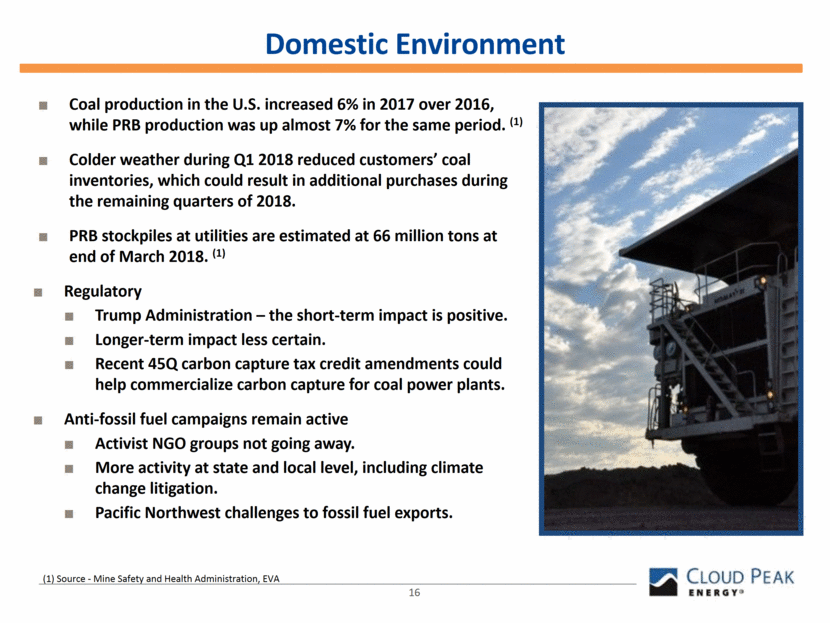
Natural Gas Storage and Pricing Natural Gas Storage Domestic production and demand are forecast to increase this year along with exports. Storage levels were down 34% from last year. So far in 2018, withdrawals have been stronger than 2017. Natural Gas Pricing and Rig Count Weather remains the primary pricing driver. Rig count levels remain steady near 190 through Q1 2018. Prices have dropped to the $2.75 MMBtu range. Projected 2018 production increase is a concern, while rising exports are a positive. 17 Source: EIA Source: EIA, Baker Hughes 0 1,000 2,000 3,000 4,000 5,000 BCF Week 5-Year Range 2018 2017 $1.50 $2.00 $2.50 $3.00 $3.50 $4.00 $4.50 $5.00 $5.50 $6.00 0 50 100 150 200 250 300 350 400 450 Price ($/MMBtu) Rig Count Rigs Price
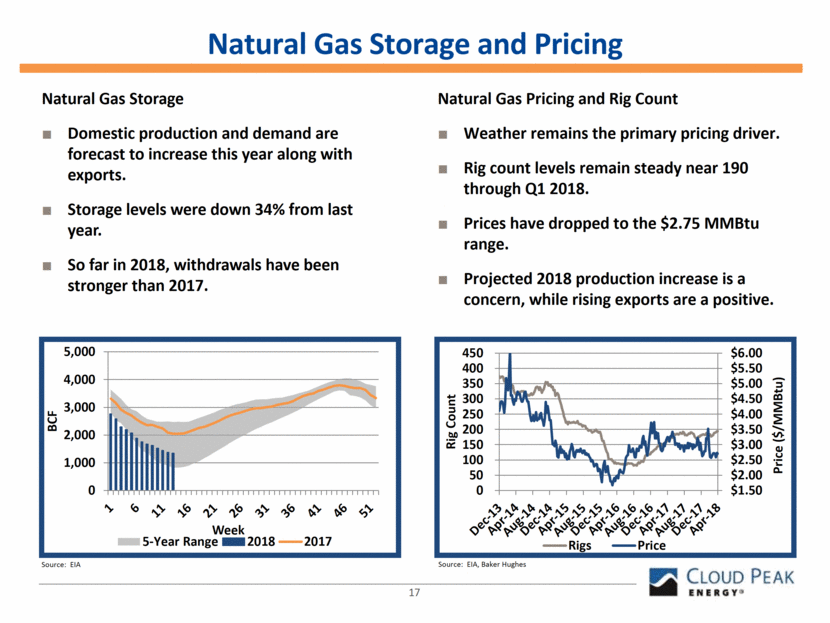
18 Powder River Basin 41% 59% 31% 69% Source: MSHA 2008 - 2016 and Company Estimates 2017 SPRB Production Volatility Production rebounded 17 million tons in 2017 over 2016. Higher natural gas prices. More normal weather. Increasing consumption. 2018 volumes are expected to be lower primarily driven by plant closures particularly impacting 8400 Btu mines. Colder winter weather to start 2018 has increased consumption of PRB coal. 0 50 100 150 200 250 300 350 400 450 2009 2010 2011 2012 2013 2014 2015 2016 2017 2018E (million tons) Southern PRB Production Trends 8400 vs. 8800, 2009 - 2018 8800 Btu 8400 Btu
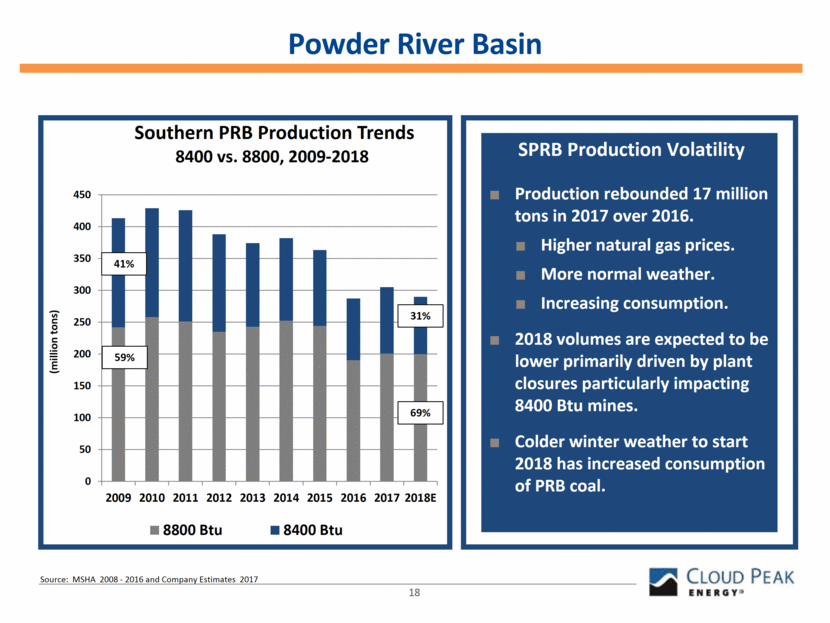
19 CPE Forward Sales Position 2018 has 47 million tons committed and fixed at weighted-average price of $12.28/ton. The 47 million tons committed includes 3.3 million export tons. 5 million tons of domestic sales needed to meet the mid-point of our production guidance range. 2019 has 17 million tons committed and fixed at weighted-average price of $12.63/ton. 47 17 7 47 24 0 10 20 30 40 50 60 70 80 2018 2019 Committed tons with variable pricing Committed tons with fixed pricing Total Committed Tons (as of 4/24/18)
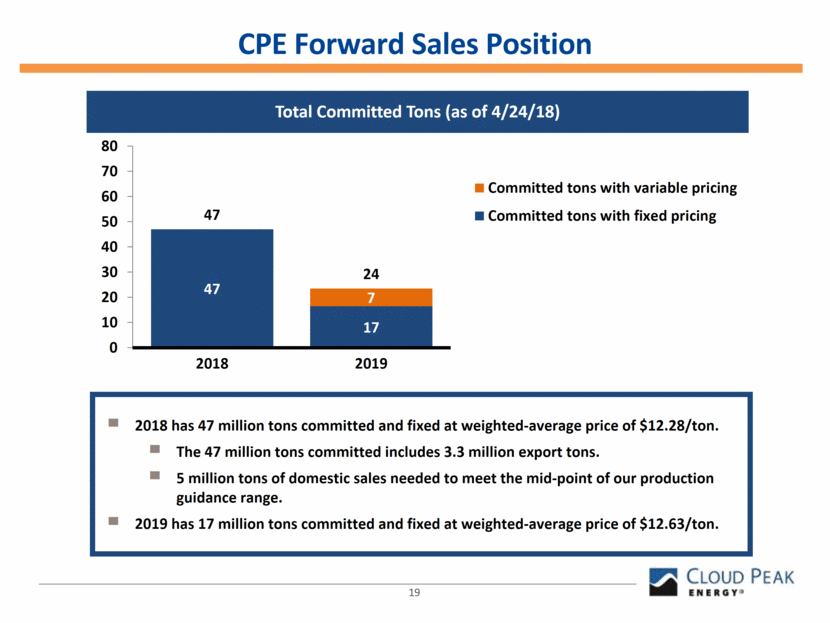
Export Environment 20
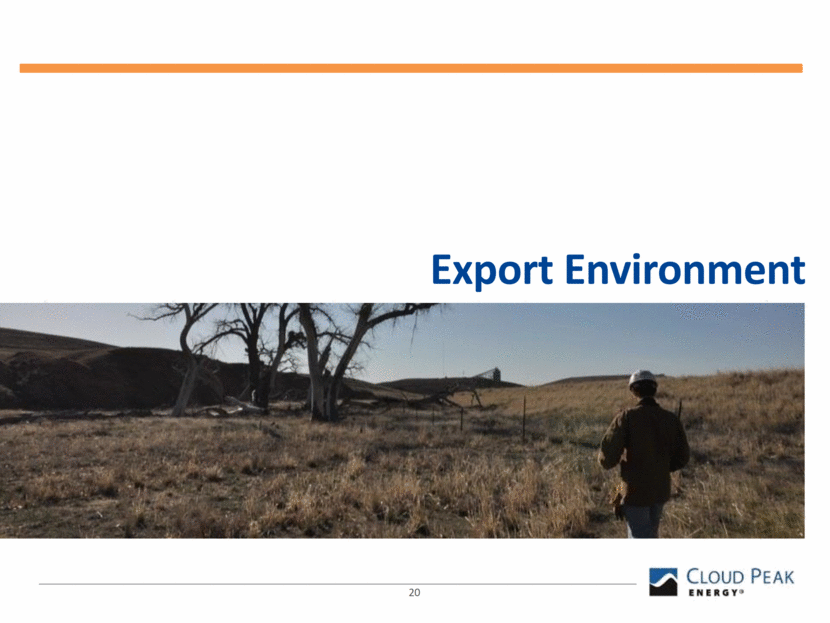
21 Export Demand Cold weather, overall electric generation growth, and strong coal-fired power demand from China impacted near-term growth while positive longer-term fundamentals continue. Asian seaborne demand increased by 40 million metric tons in 2017 and is expected to grow by 25 million tonnes in 2018. The commissioning of new coal-fired power plants and growing electric consumption throughout Asia are the primary drivers increasing demand for seaborne thermal coal. Customer concerns about Indonesian coal quality inconsistency and supply concentration are encouraging them to purchase U.S. coal. During the first quarter of 2018, prices have softened on increasing supply and seasonal supply/demand fundamentals but prices are projected to rebound during the summer strong demand period. Source: Commodity Insights
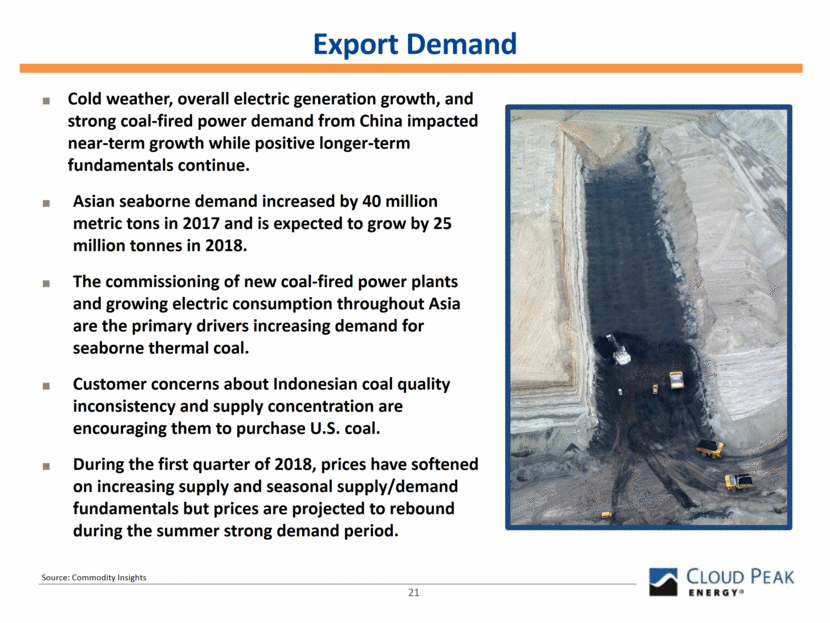
22 Export Demand Over the next 5 years, new coal-fired generation in Asia, outside of China, is forecast to grow by 23 Gigawatts. This generation growth is expected to increase seaborne thermal coal demand by 20 to 25 million metric tons per annum. This growth assumes that Chinese import demand remains stable and that Chinese governmental policies remain constant. Pricing should be supported by demand growth. Any supply response is expected to be delayed by the past several years of low capital investment in Australia and Indonesia. Source: Wood Mackenzie, Commodity Insights, Company estimates 0 5 10 15 20 25 2018 2019 2020 2021 2022 GWs Estimated New Coal - Fired Capacity In Key Asian Countries Japan, South Korea, Taiwan, and Vietnam
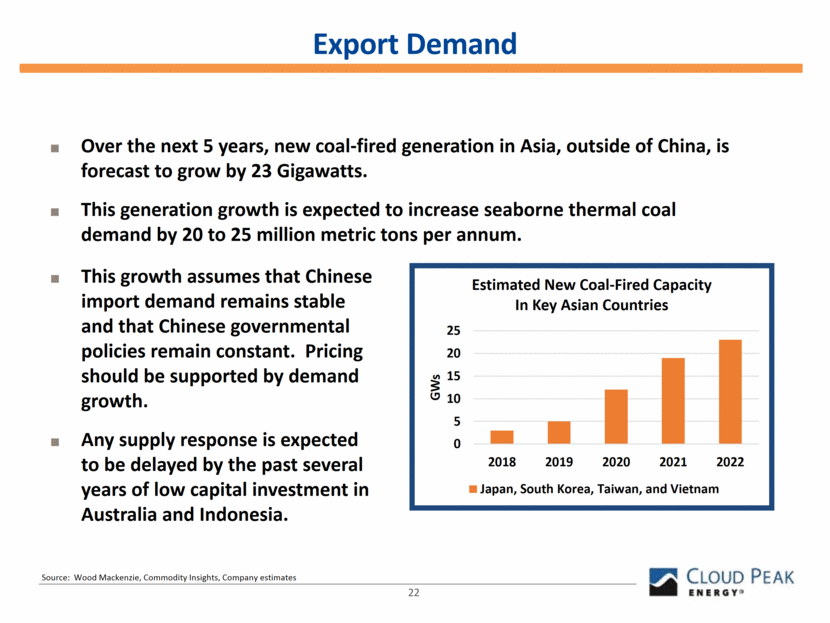
23 Through March 2018, Chinese total electric generation increased by 10%, largely supported by coal. Total Chinese thermal imports were up 40% through February 2018. Newcastle prompt month spot prices have declined during the quarter and have settled around $90 per tonne. We are expecting to export 5.5 million tons of coal in 2018 and have contracted 3.3 million tons year to date. Source: Global Coal, Platts, Company estimates Export Drivers are Cyclical $0 $20 $40 $60 $80 $100 $120 $140 (per metric ton) Newcastle & Kalimantan Price Curve NEWC Kalimantan
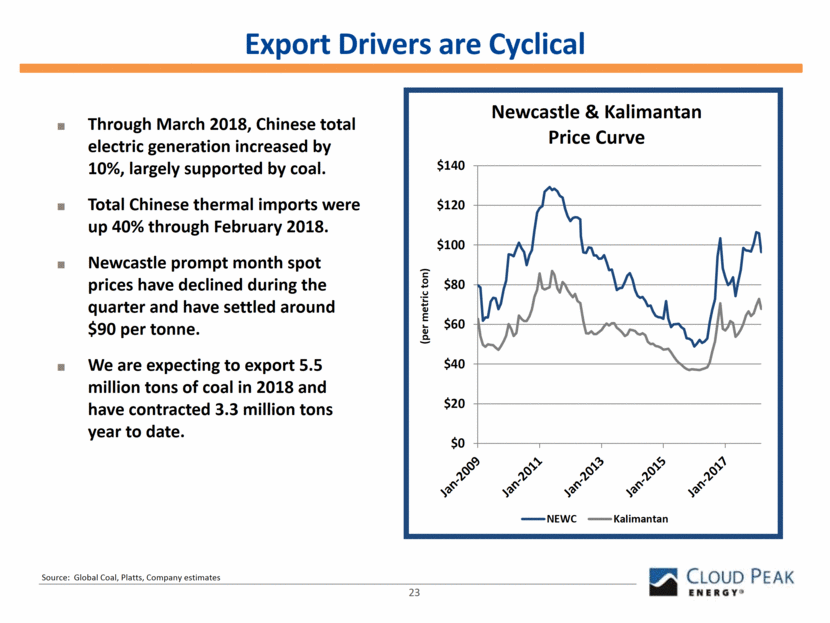
Finance 24
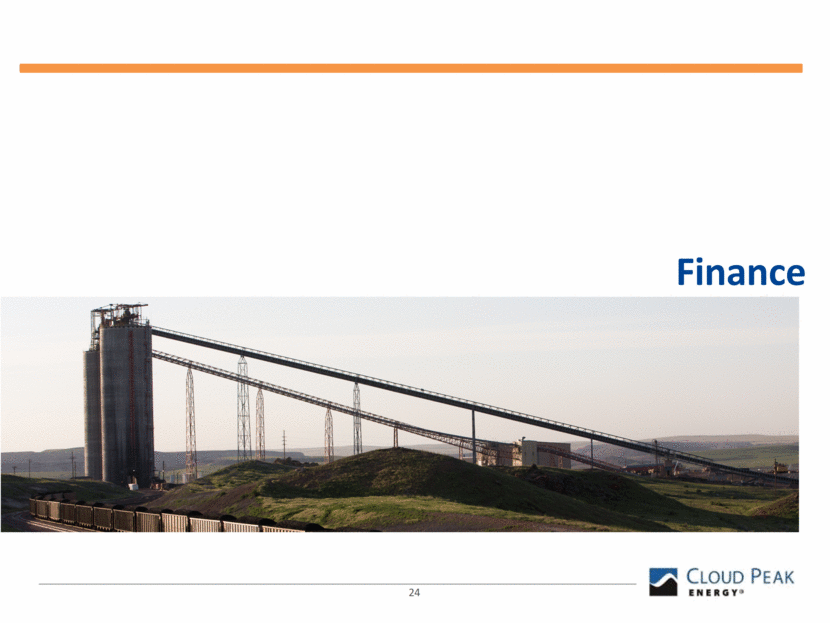
25 Managing Through Changing Environments Adjusted production to match demand, including export volumes. Reduced total costs as production declined, managed our core cash costs on a per ton basis. Mine plans indicate that strip ratios will increase more in 2018 than in recent years, resulting in higher mining costs. Successfully managed capital spend to a sustainably low level while keeping equipment fleet in good condition. Controlling Costs Reducing Capital Expenditures (1) Includes labor, repairs, maintenance, tires, explosives, outside services, and other mining costs. (2) Core cash costs have been revised from prior period presentation due to the adoption of Accounting Standards Update 2017-07. See Item 1 – Note 2 “Accounting Policies and Standards Update” of our Notes to Unaudited Condensed Consolidated Financial Statements in the March 31, 2018 Form 10-Q for additional information. $4.99 $5.05 $4.45 $4.20 $4.45 $5.20 $5.11 $5.33 $5.61 $5.42 $10.19 $10.16 $9.78 $9.81 $9.87 $0 $2 $4 $6 $8 $10 $12 2013 2014 2015 2016 2017 (cash cost per ton) Royalties/Taxes/Fuel/Lubricants Core Cash Cost (1)(2) 81.3 81.9 71.5 57.9 53.2 46.5 - 50.5 4.7 4.0 3.6 0.6 4.2 5.5 86.0 85.9 75.1 58.5 57.4 52 - 56 0 20 40 60 80 100 2013 2014 2015 2016 2017 2018E (tons in millions) North American Deliveries Asian Exports Reducing Shipments $57 $20 $39 $35 $13 $15 - 25 $79 $69 $69 $0 $20 $40 $60 $80 $100 $120 $140 2013 2014 2015 2016 2017 2018E (in millions) Capex LBA Payments
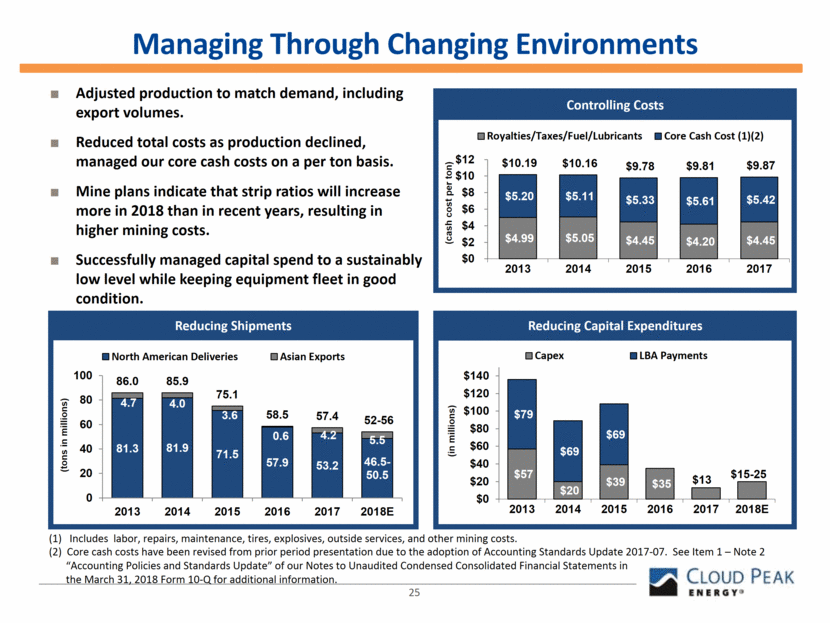
26 Liquidity and Bonding Obligations Actively Managing Financial Obligations and Commitments March 31, 2018 Cash and cash equivalents $128 Credit Agreement capacity $400 A/R Securitization 20 Available borrowing capacity 420 Letters of credit issued (1) (23) Total Available Liquidity $525 Surety bonds outstanding Third-party surety bonds $384 Lease bonds 30 Total Bonding Obligation $414 Cash balance of $127.8 million ($19.9 million increase from year end 2017). $400 million Credit Agreement has a minimum monthly liquidity covenant of $125 million. At March 31, 2018, the Company had the full available borrowing capacity under the Credit Agreement of $400 million. The Company intends to extend or replace the Credit Agreement before its maturity in February 2019 and expects that any replacement facility will be significantly smaller than the current Credit Agreement. The A/R Securitization has a maturity date of 2020 and includes the capability to issue letters of credit. As of March 31, 2018, all undrawn letters of credit were issued under the A/R Securitization Program. The undrawn letters of credit provide collateral on the reclamation surety bonds. The improved Company and coal industry conditions supported a lower amount of collateral for the reclamation bonding program. As of March 31, 2018, undrawn letters of credit were $23.0 million. (1) Letters of credit issued under our A/R Securitization Program provided approximately 5.5% collateral to sureties for reclamation bonds as of March 31, 2018. (in millions)
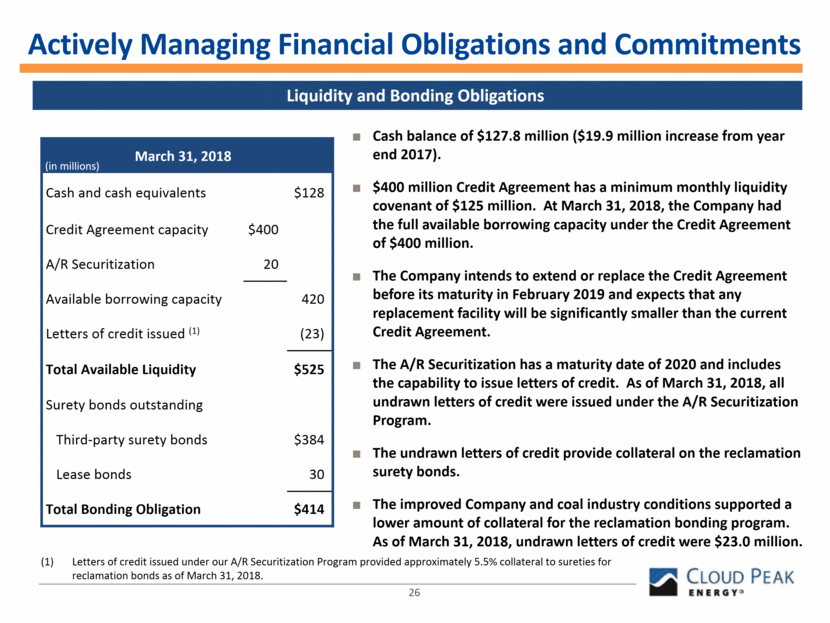
27 Maturity Profile – Debt and Transportation Commitments Actively Managing Financial Obligations and Commitments March 31, 2018 12% Second Lien Notes due 2021 $290 6.375% High-Yield Notes due 2024 56 Bonds Outstanding $346 Deferred gain and other (1) 60 Carrying Value of Debt $406 Capital leases 4 Total Debt on Balance Sheet $410 Total Debt / TTM Adjusted EBITDA (2) 3.4X Net Debt / TTM Adjusted EBITDA (2) 2.1X Transportation (3) 2018 Take-or-Pay Commitments $ 25 2019 Take-or-Pay Commitments $ 20 2020 Take-or-Pay Commitments $ 18 Through the exchange offer in Q4 2016 and equity raise in Q1 2017, accomplished total deleveraging of $153 million. Nearest principal maturity is 2021. Port and rail agreements were amended in late 2017 and early 2018 to better meet our future export needs while maintaining low overall take-or-pay commitments. Represents the deferred gain on the Q4 2016 bond exchange transaction less unamortized debt issuance costs and cash premium paid Total debt includes high-yield notes and capital leases Commitments represent replacement Westshore and BNSF agreements. Does not include back-to-back Westshore and BNSF agreements in support of the JERA Trading agreement. See Item 7—“Management’s Discussion and Analysis of Financial Condition and Results of Operations—Contractual Obligations” in our 2017 Form 10-K and Item 8—Note 9 “Transportations Agreements” of our Notes to Consolidated Financial Statements in our Form 10-K for additional information. The Company intends to extend or replace the Credit Agreement before its maturity in February 2019 and expects that any replacement facility will be significantly smaller than the current Credit Agreement. (in millions) (4) $0 $100 $200 $300 $400 Credit Facility A/R Securitization Bonds Take-or-Pay Commitments
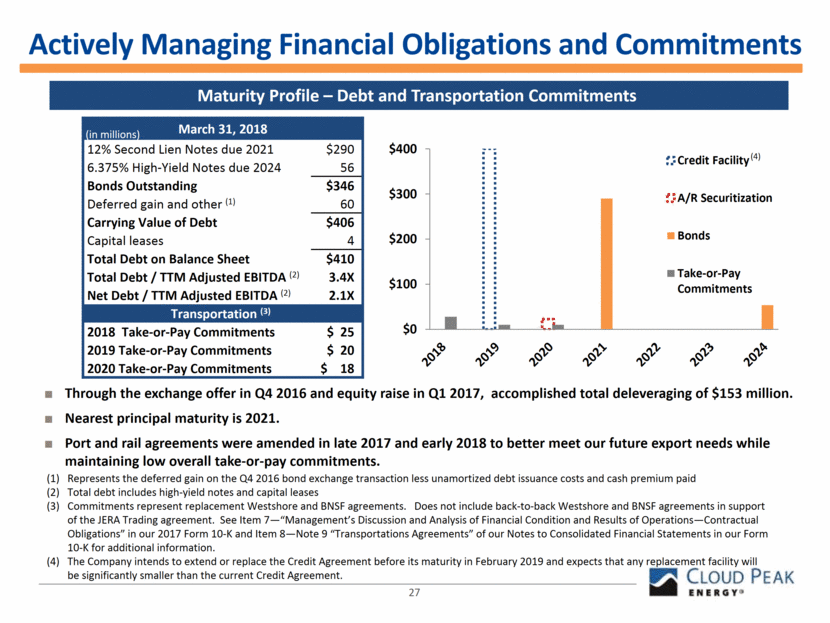
28 2018 Guidance (as of April 26, 2018) Coal shipments for our three mines (1) 52 – 56 million tons Committed sales with fixed prices Approximately 47 million tons Anticipated realized price of produced coal with fixed prices Approximately $12.28 per ton Adjusted EBITDA (2) $75 – $100 million Net interest expense Approximately $37 million Cash interest paid Approximately $42 million Depreciation, depletion, amortization, and accretion $75 – $85 million Capital expenditures $15 – $25 million Inclusive of intersegment sales. Non-GAAP financial measure; please see definition above in this presentation. Management did not prepare estimates of reconciliation with comparable GAAP measures, including net income, because information necessary to provide such a forward-looking estimate is not available without unreasonable effort.
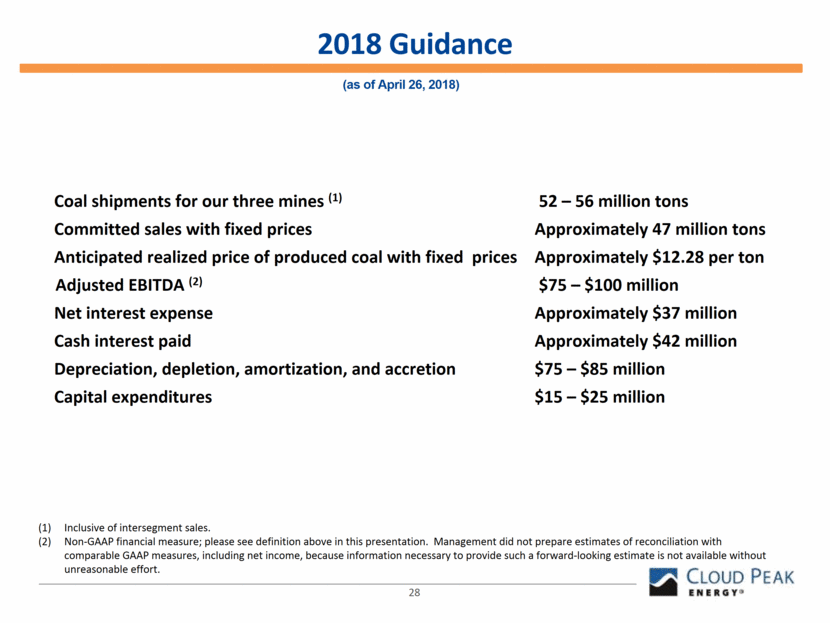
Appendix 29
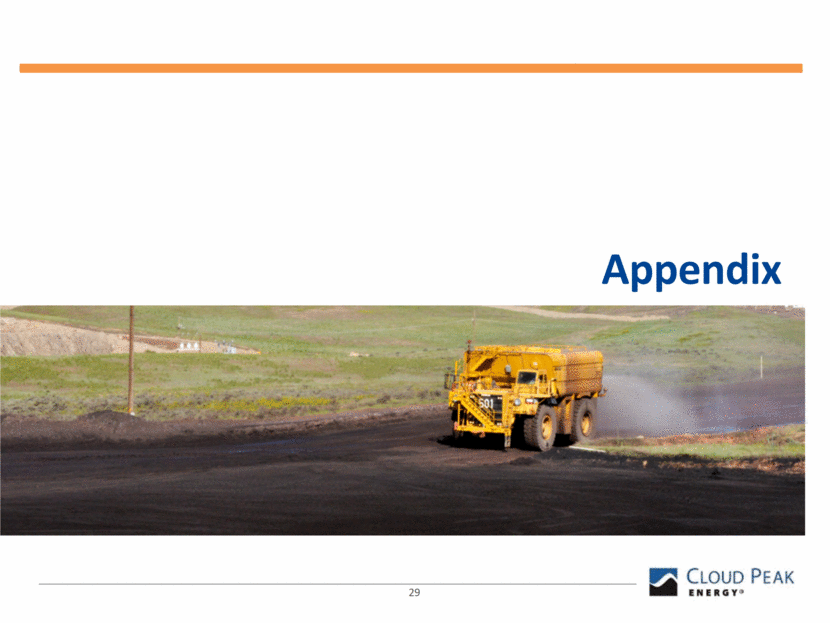
Note: Represents average cost of product sold for produced coal for our three mines. $9.81/ton $10.19/ton 2014 2015 2013 $10.23/ton 2016 $9.75/ton Royalties and taxes Labor Repairs, maintenance, and tires Fuel and lubricants Explosives Outside services Other mining costs 2017 $9.78/ton Average Cost of Produced Coal 30 36% 20% 15% 13% 6% 4% 6% 38% 27% 13% 8% 6% 3% 5% 37% 28% 14% 7% 6% 2% 6% 37% 21% 15% 12% 6% 4% 5% 38% 24% 15% 8% 6% 4% 5%
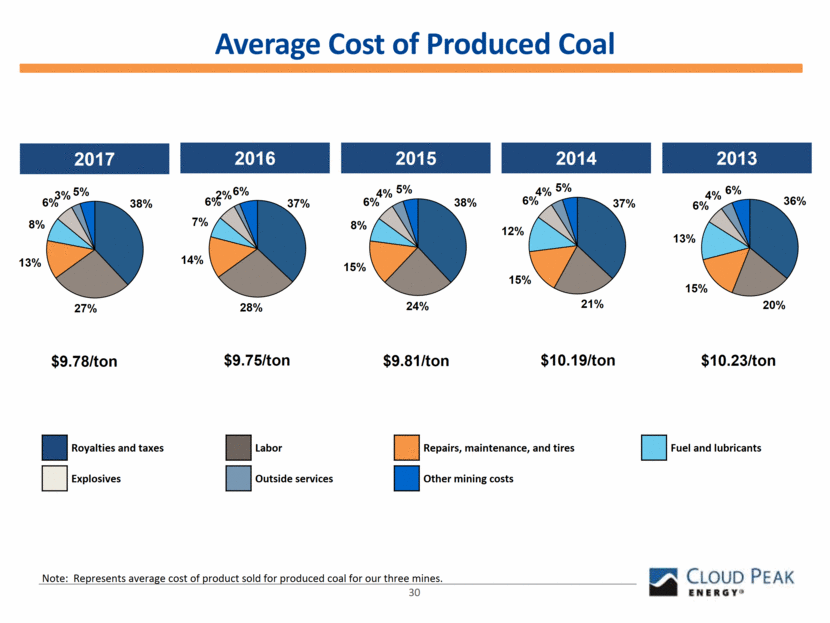
31 Major Mine Equipment - 2017 Antelope Mine 2 draglines 8 shovels 22 830E haul trucks 15 930E haul trucks 16 dozers 4 excavators 5 drills Cordero Rojo Mine 2 draglines 6 shovels 31 830E haul trucks 14 dozers 3 excavators 4 drills Spring Creek Mine 2 draglines 3 shovels 12 830E haul trucks 7 dozers 3 excavators 4 drills
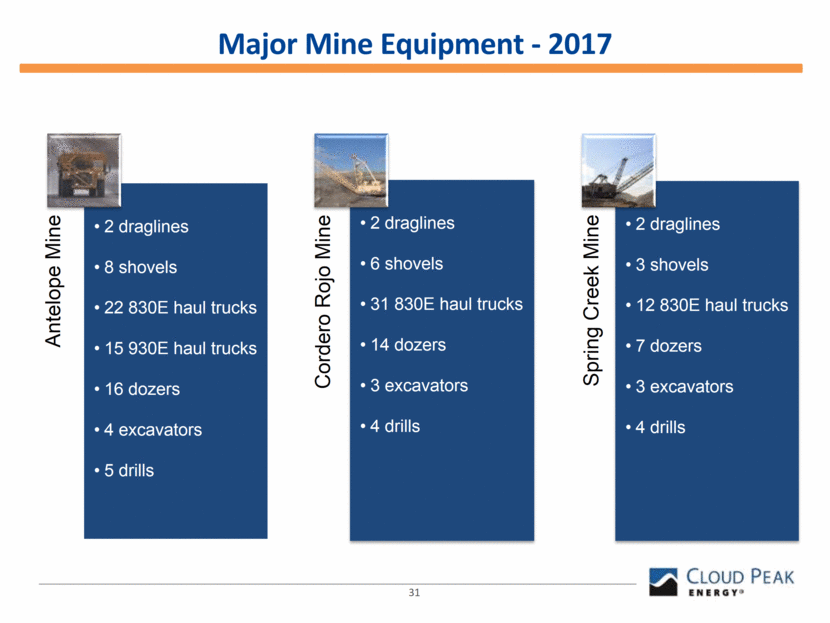
Owned and Operated Mines 32 Our Owned and Operated Mines segment comprises the results of mine site sales from our three mines primarily to our domestic utility customers and also to our Logistics and Related Activities segment. (1) Calculated by subtracting the average cost per ton sold from the realized price per ton sold. (2) Non-GAAP financial measure; see definition above in this presentation and the attached reconciliation tables. Quarter Ended (in millions, except per ton amounts) 3/31/2018 3/31/2017 Tons sold 12.3 14.0 Revenue $ 153.7 $ 173.6 Cost of product sold $ 136.0 $ 140.4 Realized price per ton sold $ 12.20 $ 12.10 Average cost of product sold per ton $ 10.94 $ 9.87 Cash margin per ton sold (1) $ 1.26 $ 2.23 Segment operating income (loss) $ 1.2 $ 10.6 Adjusted EBITDA (2) $ 18.6 $ 33.7
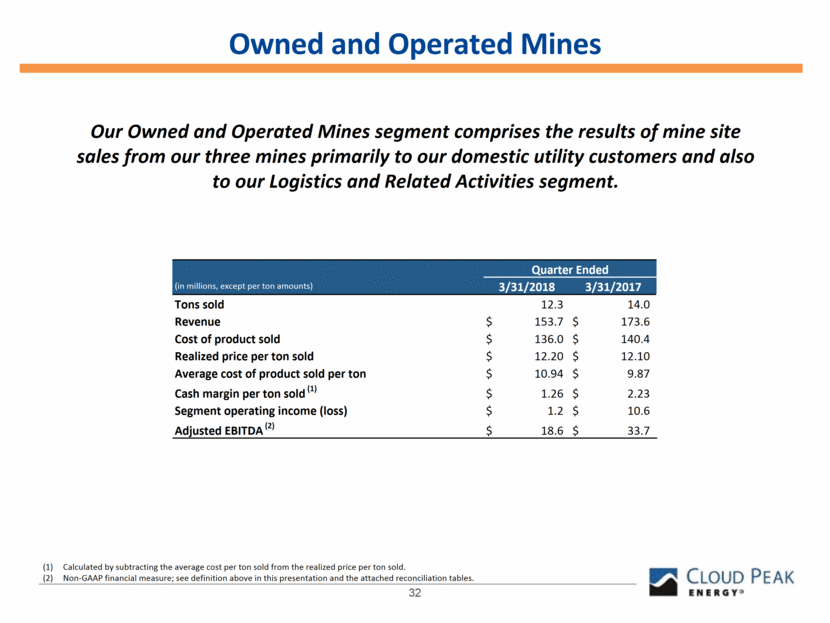
Logistics and Related Activites 33 Our Logistics and Related Activities segment comprises the results of our logistics and transportation services to our domestic and international customers. For the quarter ended March 31, 2018, the domestic logistics volumes were 43,800 tons. Calculated by subtracting the average cost per ton sold from the realized price per ton sold. Non-GAAP financial measure; see definition above in this presentation and the attached reconciliation tables. Quarter Ended (in millions, except per ton amounts) 3/31/2018 3/31/2017 Total tons delivered 1.4 0.6 Asian exports (tons) 1.4 0.5 Domestic (tons) (1) — 0.1 Revenue $ 79.6 $ 28.2 Total cost of product sold $ 74.2 $ 35.7 Asian Exports (per ton sold) Realized price $ 57.13 $ 49.53 Average cost $ 52.09 $ 55.67 Cash margin (2) $ 5.04 $ (6.14) Domestic (per ton sold) Realized price $ 35.61 $ 46.42 Average cost $ 30.82 $ 42.43 Cash margin (2) $ 4.79 $ 3.99 Segment operating income (loss) $ 5.4 $ (7.4) Adjusted EBITDA (3) $ 7.1 $ (2.6)
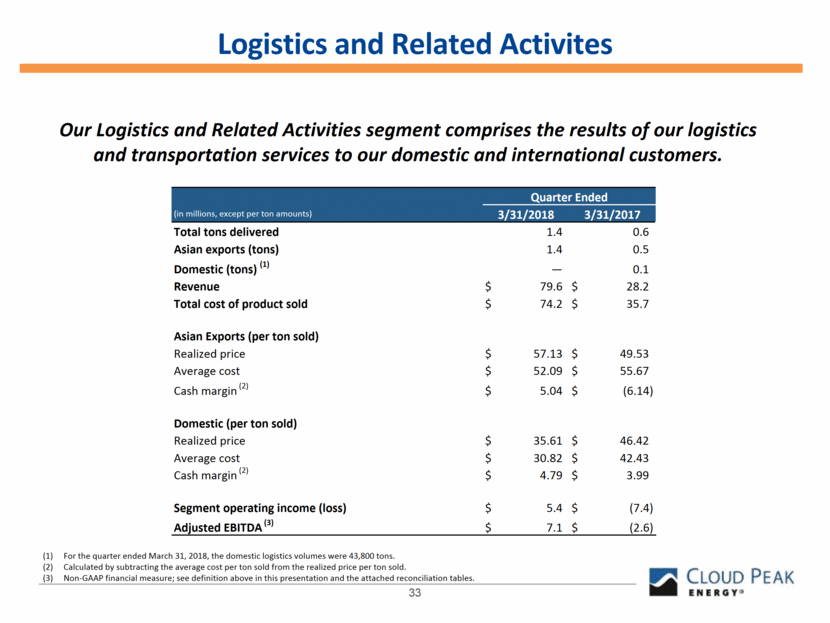
Statement of Operations Data 34 Three Months Ended March 31, (in millions, except per share amounts) 2018 2017 Revenue $ 216.3 $ 195.7 Operating income (loss) $ (0.4) $ (8.5) Net income (loss) $ (7.7) $ (20.1) Earnings (loss) per common share Basic $ (0.10) $ (0.30) Diluted $ (0.10) $ (0.30)
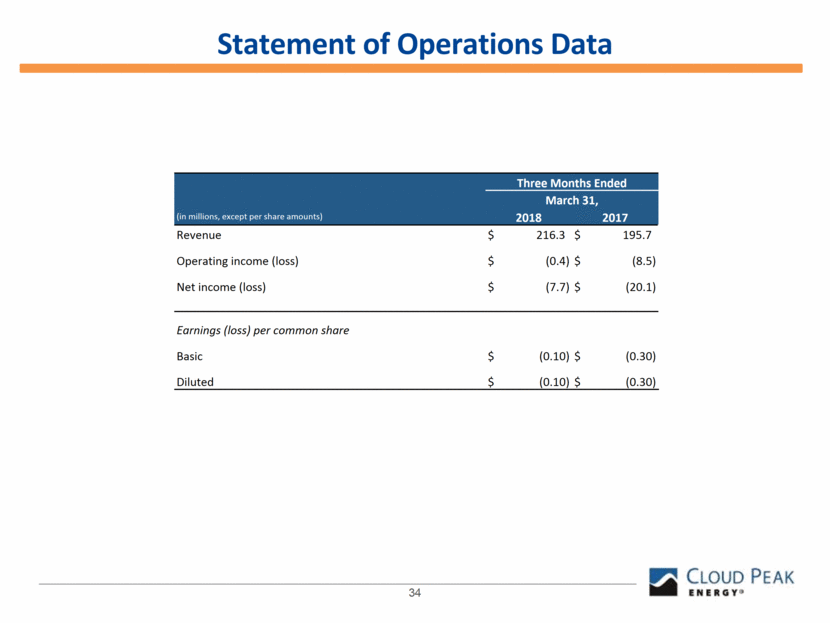
Statement of Operations Data 35 Year Ended December 31, (in millions, except per share amounts) 2017 2016 2015 2014 2013 Revenue $ 887.7 $ 800.4 $ 1,124.1 $ 1,324.0 $ 1,396.1 Operating income (loss) $ (1.4) $ 63.2 $ (78.2) $ 134.6 $ 115.8 Net income (loss) $ (6.6) $ 21.8 $ (204.9) $ 79.0 $ 52.0 Earnings (loss) per common share Basic $ (0.09) $ 0.36 $ (3.36) $ 1.30 $ 0.86 Diluted $ (0.09) $ 0.35 $ (3.36) $ 1.29 $ 0.85 (1) Net loss for 2015 was impacted by the $111.8 million non-cash valuation allowance adjustment on deferred tax assets based upon then-forecasted taxable earnings and a $58.2 million non-cash asset impairment recorded due to lower forecasted earnings as a result of the weak international coal prices at that time.
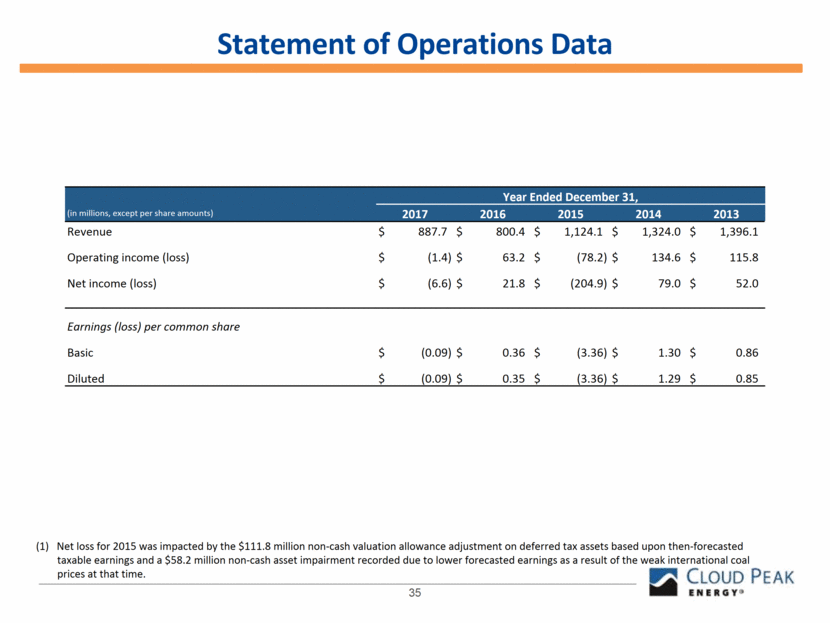
Balance Sheet Data 36 March 31, December 31, (in millions) 2018 2017 2016 2015 2014 Cash, cash equivalents and investments $ 127.8 $ 107.9 $ 83.7 $ 89.3 $ 168.7 Restricted cash $ 0.7 $ 0.7 $ 0.7 $ 8.5 $ 2.0 Property, plant and equipment, net $ 1,355.0 $ 1,365.8 $ 1,432.4 $ 1,488.4 $ 1,589.1 Total assets $ 1,689.1 $ 1,698.7 $ 1,714.8 $ 1,802.2 $ 2,151.2 Senior notes, net of unamortized discount $ 406.3 $ 405.3 $ 475.0 $ 491.2 $ 489.7 Federal coal lease obligations $ 1.8 $ — $ — $ — $ 64.0 Asset retirement obligations, net of current portion $ 100.8 $ 99.3 $ 97.0 $ 151.8 $ 216.2 Total liabilities $ 690.3 $ 690.9 $ 763.1 $ 914.3 $ 1,063.3 Total equity $ 998.8 $ 1,007.8 $ 951.7 $ 887.9 $ 1,087.8
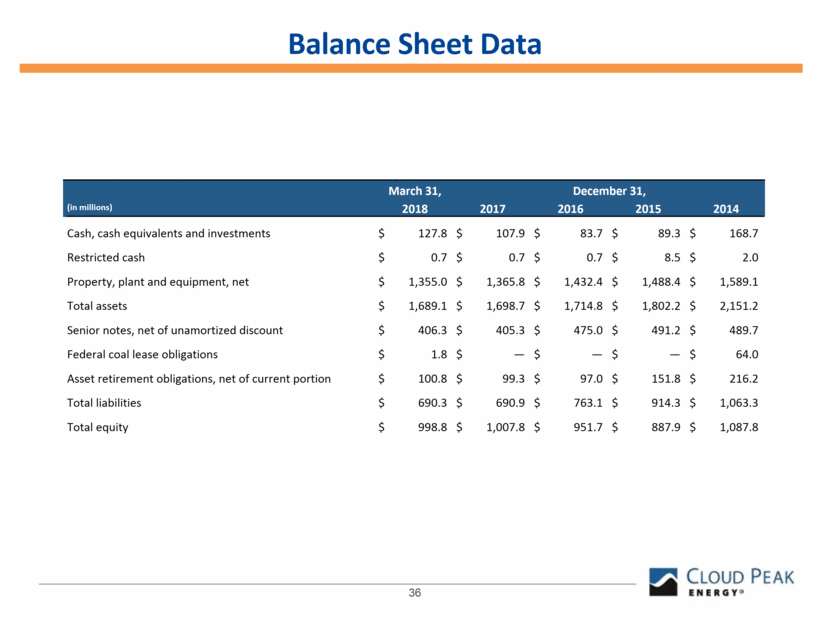
Reconciliation of Non-GAAP Measures 37 Adjusted EBITDA (1) Fair value mark-to-market (gains) losses reflected on the statements of operations. Cash amounts received and paid reflected within operating cash flows. Three Months Ended Trailing Twelve March 31, Months Ended (in millions) 2018 2017 March 31, 2018 Net income (loss) $ (7.7) $ (20.1) $ 5.7 Interest income (0.3) - (0.7) Interest expense 9.2 12.9 37.6 Income tax expense (benefit) 0.1 0.3 (29.7) Depreciation and depletion 15.0 18.6 68.6 EBITDA $ 16.2 $ 11.7 $ 81.6 Accretion 1.7 1.8 7.0 Derivative financial instruments: Exclusion of fair value mark-to-market losses (gains) (1) — 2.3 0.3 Inclusion of cash amounts received (paid) (2) — (0.3) (1.6) Total derivative financial instruments — 2.0 (1.3) Non-cash throughput amortization expense and contract termination payments 1.7 4.9 16.9 Adjusted EBITDA $ 19.6 $ 20.4 $ 104.2
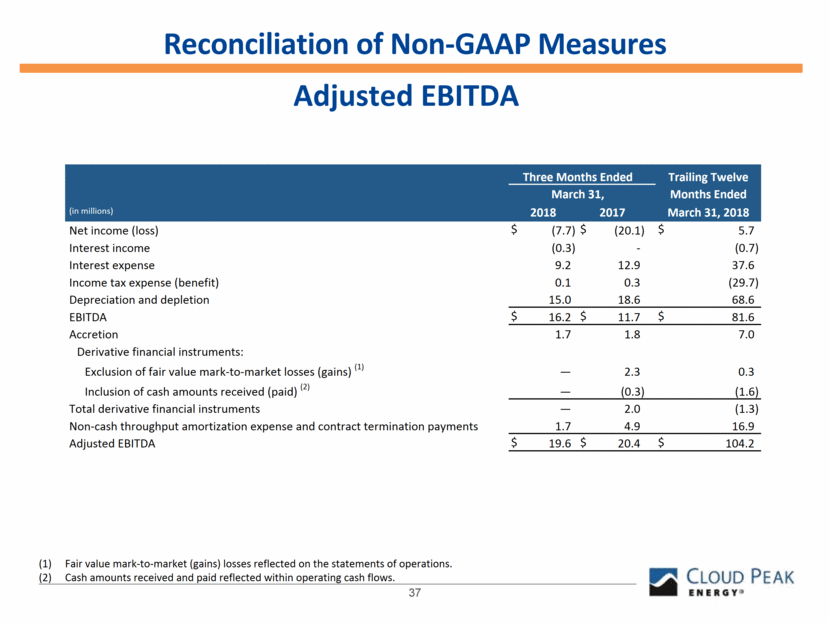
Reconciliation of Non-GAAP Measures 38 Adjusted EBITDA (1) Changes to related deferred taxes are included in income tax expense. (2) Fair value mark-to-market (gains) losses reflected on the statement of operations. (3) Cash amounts received and paid reflected within operating cash flows. (4) Excludes premiums paid at option contract inception of $5.8 million and $4.0 million during the years ended December 31, in 2015 and 2014, respectively, for original settlement dates in subsequent years. (5) Non-cash impairments of $33.4 million related to goodwill at the Cordero Rojo Mine, $52.2 million of port access rights, and $6.0 million related to our investment in GPT during the year ended December 31, 2015. Year Ended December 31, (in millions) 2017 2016 2015 2014 2013 Net income (loss) $ (6.6) $ 21.8 $ (204.9) $ 79.0 $ 52.0 Interest income (0.5) (0.1) (0.2) (0.3) (0.4) Interest expense 41.4 47.4 47.6 77.2 41.7 Income tax expense (benefit) (29.5) (2.2) 77.4 34.9 11.6 Depreciation and depletion 72.3 27.2 66.1 112.0 100.5 Amortization of port access rights — — 3.7 — — EBITDA $ 77.0 $ 94.1 $ (10.4) $ 302.8 $ 205.3 Accretion 7.1 6.6 12.6 15.1 15.3 Tax agreement expense (benefit) (1) — — — 58.6 (10.5) Derivative financial instruments: Exclusion of fair value mark-to-market losses (gains) (2) 2.7 (8.2) 30.6 (7.8) (25.6) Inclusion of cash amounts received (paid) (3)(4) (1.9) (3.3) (0.6) 24.7 13.0 Total derivative financial instruments 0.8 (11.5) 30.0 16.9 (12.6) Impairments (5) — 4.6 91.5 — — Gain on sale of Decker Mine interest — — — (74.3) — Debt Restructuring costs — 4.7 — — — Non-cash throughput amortization expense and contract termination payments 20.1 — — — — Adjusted EBITDA $ 104.9 $ 98.6 $ 123.8 $ 201.9 $ 218.6
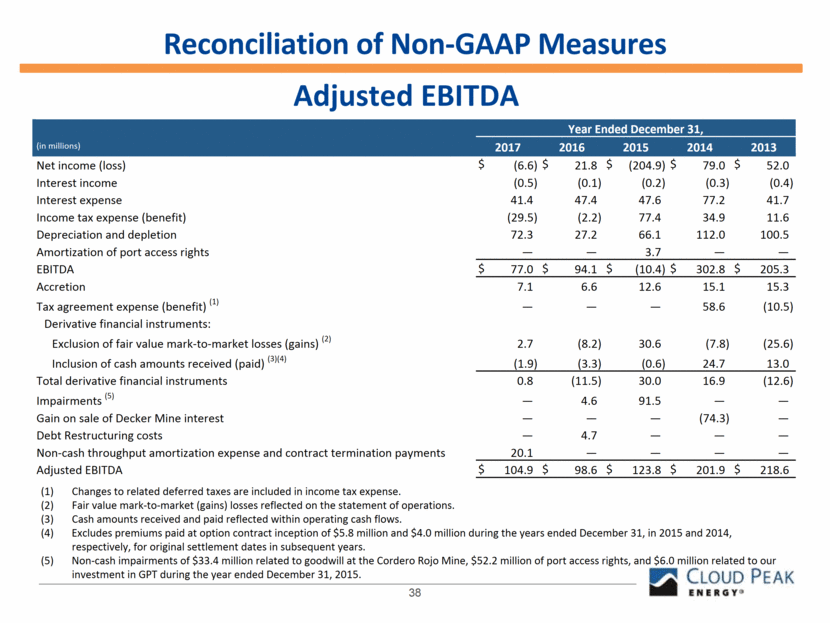
Adjusted EBITDA by Segment 39 Three Months Ended March 31, (in millions) 2018 2017 Net income (loss) $ (7.7) $ (20.1) Interest income (0.3) — Interest expense 9.2 12.9 Other, net 0.3 0.3 Income tax (benefit) expense 0.1 0.3 Earnings from unconsolidated affiliates, net of tax (0.3) (0.3) Net periodic postretiremen benefit cost (income), exluding service cost (1.6) (1.6) Consolidated operating income (loss) $ (0.4) $ (8.5) Owned and Operated Mines Operating income (loss) $ 1.2 $ 10.6 Depreciation and depletion 14.7 18.5 Accretion expense 1.6 1.7 Derivative financial instruments: Exclusion of fair value mark-to-market (gains) losses — 2.3 Inclusion of amounts received (paid) — (0.3) Total derivative financial instruments — 2.0 Net periodic postretirement benefit income (cost), excluding service cost 1.3 1.3 Other (0.2) (0.4) Adjusted EBITDA $ 18.6 $ 33.7 Logistics and Related Activities Operating income (loss) $ 5.4 $ (7.4) Derivative financial instruments: Non-cash throughput amortization expense and contract termination payments 1.7 4.9 Other — (0.1) Adjusted EBITDA $ 7.1 $ (2.6) Unallocated Operating Income Other operating income (loss) $ (7.7) $ (11.3) Elimination of intersegement operating income (loss) $ 0.7 $ (0.4)
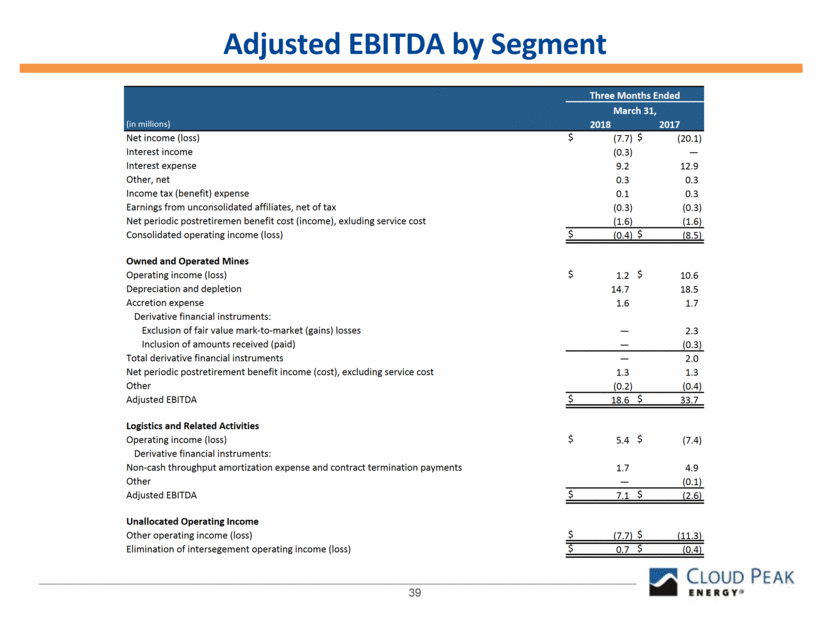
Other Data 40 Represents the 50% share in a former non-operating interest divested by Cloud Peak Energy in September 2014. Represents only our three Owned and Operated Mines. Q1 Q4 Q3 Q2 Q1 Year Year Year Year Year (in thousands) 2018 2017 2017 2017 2017 2017 2016 2015 2014 2013 Tons sold Antelope Mine 6,660 6,540 7,813 6,711 7,375 28,439 29,807 35,167 33,647 31,354 Cordero Rojo Mine 2,600 3,955 3,770 4,227 4,441 16,394 18,332 22,872 34,809 36,670 Spring Creek Mine 2,999 3,047 3,959 3,390 2,210 12,606 10,348 17,027 17,443 18,009 Decker Mine(1) - - - - - - - - 1,079 1,519 Total tons sold 12,259 13,542 15,542 14,328 14,026 57,439 58,488 75,066 86,978 87,552 Average realized price per ton sold(2) $12.20 $11.98 $12.32 $12.25 $12.10 $12.17 $12.40 $12.79 $13.01 $13.08 Average cost of product sold per ton(2) $10.94 $10.18 $9.65 $9.81 $9.87 $9.87 $9.81 $9.78 $10.16 $10.19
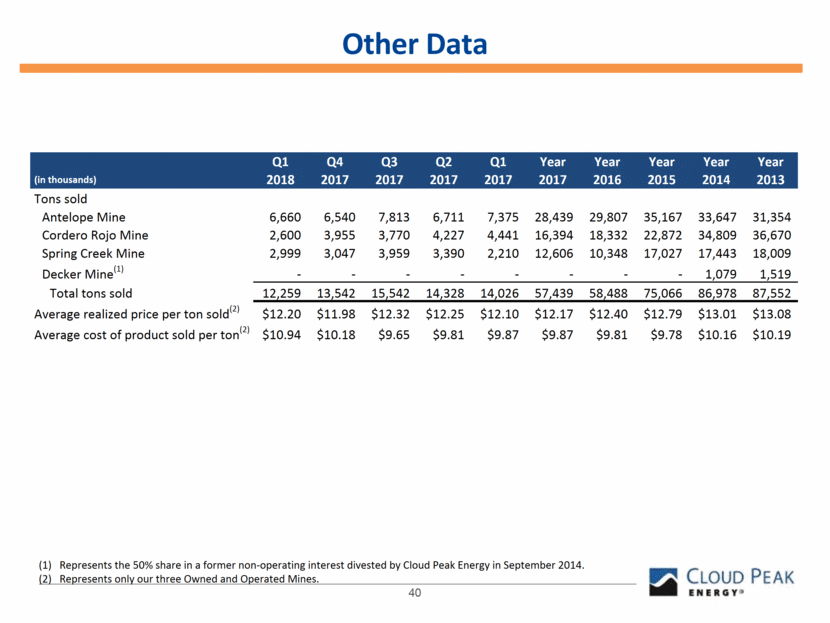
High Quality Customer Base Our Deliveries to Power Plants in 2016 41
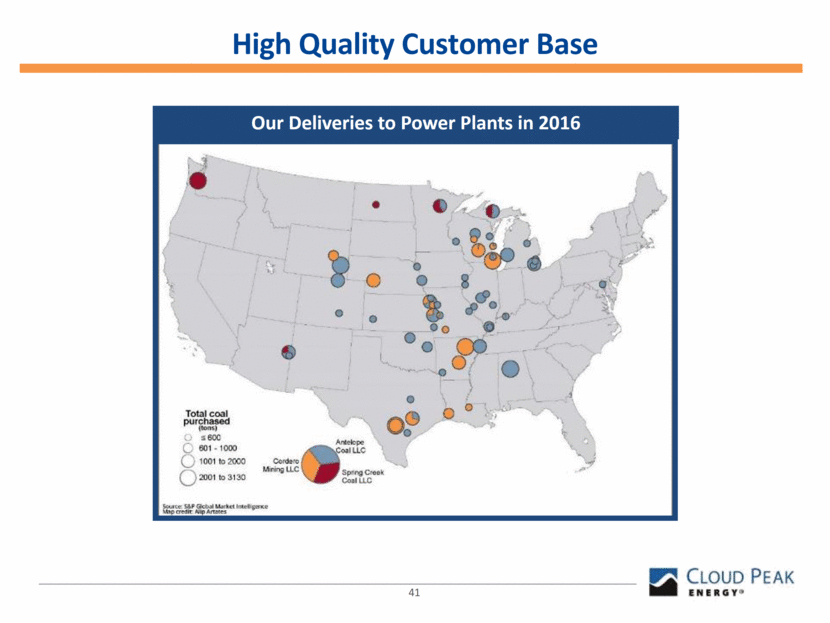
High Quality Customer Base U.S. Coal Consumption by Region in 2016 42
